
11 October 22
Live on the homepage now!
Reader Supported News
THIS SERVICE CANNOT EXIST WITHOUT COMMUNITY SUPPORT: The very nature of what we do requires for its existence community support. A donation is a form of participation. It's not about the money, that can be accomplished through other means. It's about encouraging the community to take a fundamental role in the information process that serves them. Donate and participate. In peace and solidarity.
Marc Ash • Founder, Reader Supported News
Sure, I'll make a donation!
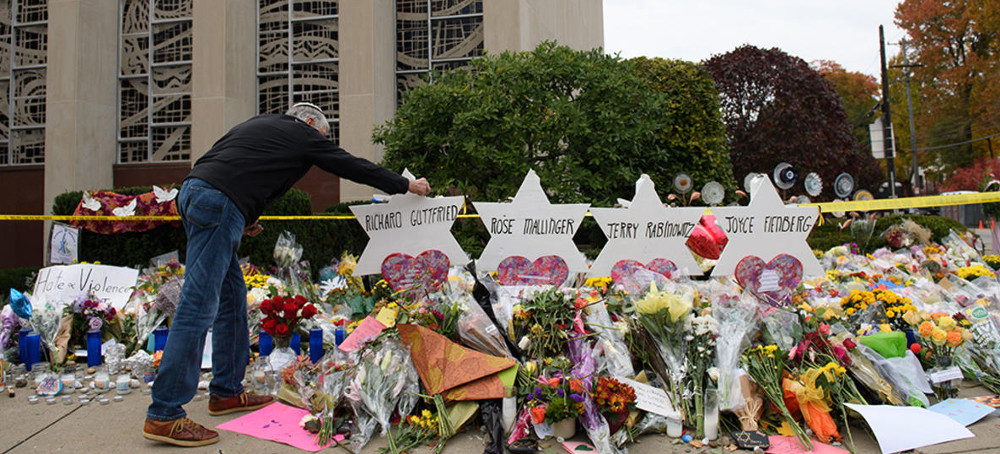
Dan Rather and Elliot Kirschner | Antisemitism Is Evil
Dan Rather and Elliot Kirschner, Steady
Excerpt: "Antisemitism. Some of us forget about it. Some never learn about it. And some resolutely reject it."
Hate is hate. It doesn’t get much more complicated than that.
Antisemitism.
Some of us forget about it.
Some never learn about it.
And some resolutely reject it.
But it needs to be discussed, often as a reminder, and taught to the young of each succeeding generation. It is an essential lesson of history, past and present.
Antisemitism is evil.
Antisemitism must be condemned in all its forms.
Antisemitism is a toxic seed that, once sown and cultivated, poisons society.
Antisemitism is never a joke. Never brave “speech.” Never clever social commentary.
It is hate. Often murderous hate.
And like racism, xenophobia, homophobia, misogyny, and other forms of hate, antisemitism is a destructive and violent force that will continue to weaken our nation and our world unless it is continually confronted head on, with unity, energy, and action.
The inspiration for this post today is the antisemitic vitriol of the musician Kanye West. If you want to know more about what he said and who he is, there is no shortage of sources for that information. But while we should hold accountable the individuals who spew hate, we cannot overlook the broader environment that is allowing this bile to spread.
And we cannot excuse or condone all those who know better but remain silent, let alone those who wink and nod along for their own cynical gain.
We have written before about antisemitism on Steady. We do so out of a sense of decency and duty, and because history and personal experience have taught us how important it is. Ancient wisdom needs to be repeated in order to be learned, preserved, and passed on. It is especially important that younger generations learn the historical lessons of hate and that they see adults disavow it. The Jewish holiday of Passover is guided by this instinct; the story of slavery, persecution, and freedom is told every year, and children play an important role in confronting it. But all of us, regardless of faith or other heritage, need to join in raising awareness for pervasive threats to the health and security of our fellow citizens and ourselves.
Antisemitism is like gun violence, the threats to our democracy, racial injustice, and many other destructive forces that pool beneath the surface, waiting to erupt. In a repetitive raising of awareness, we can build defenses of strength and resilience.
That all of this has to be said again is the point.
That it is often not seen as news because it is so prevalent is the point.
That antisemitism competes with a surge of other hate speech, which also is no longer treated as news, is the point.
That often this kind of dangerous rhetoric goes by with little comment or notice is the point.
That too many with powerful voices and platforms condone, excuse, or ignore this hatred is the point.
Hate is hate. It doesn’t get much more complicated than that.
Those who spew or defend hate often use contortions, rationalizations, and lies to try to obscure the purity of the hate. They want to make it seem that THEY are the victims.
It’s why Putin claims that he is pursuing “de-Nazification” of Ukraine when he rains down missiles on parks, schools, and hospitals, and his troops torture and murder civilians, dumping bodies into mass graves.
Here in the United States, it’s why politicians have long stoked fear and animosity toward the “other” — defined in different times and places in different ways, as Black, Asian, Jewish, Catholic, Muslim, Latino, Native American, etc. — as “replacing” and endangering the “real America.”
A few days ago, Alabama Senator Tommy Tuberville spoke at a Trump rally and said the quiet part out loud. Referring to Democrats and Black voters in particular, Tuberville riled up the Trump base with this straight-up racist rhetoric: "They are not soft on crime. They're pro-crime. They want crime. They want crime because they want to take over what you got. They want to control what you have. They want reparations because they think the people that do the crime are owed that."
It’s not so different from what segregationist politicians were saying in the 1960s, except then they might have used a more overtly racist term to describe those they were attacking than “they.”
The general response from Republican politicians to Tuberville was largely the same as it was to Kanye West, or Donald Trump for that matter — a combination of silence, deflection, and various levels of endorsement.
Their cravenness deserves attention, even if it happens over, and over, and over again.
What can we do about it? We can start by being allies to those under attack. In the case of antisemitism, it’s especially important that the burden for raising this issue does not fall on only Jewish Americans. It’s the same for racism, homophobia, and misogyny. We all must speak out. We must use whatever platforms we have to spread messages of support and outrage, to share history, and to elevate voices of healing and understanding.
Ultimately, all the energy that those who spew hate spend trying to convince us that it isn’t really hate is a tipoff that hate is unpopular. So let the spotlight of truth illuminate it for all to see — and call it what it is — so that it can be repudiated and defeated, especially at the ballot box.
READ MORE
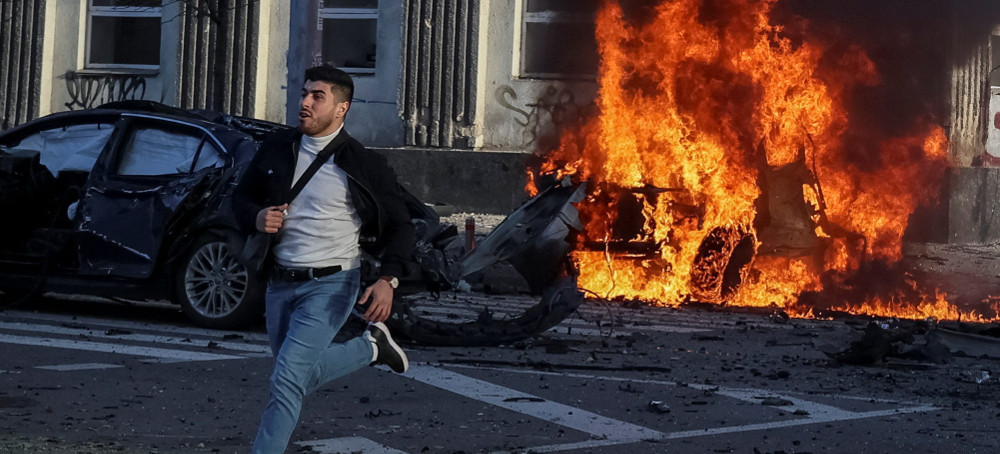 Cars burn after Russian military strike, as Russia's invasion of Ukraine continues, in central Kyiv, Ukraine October 10, 2022. (photo: Gleb Garanich/Reuters)
Cars burn after Russian military strike, as Russia's invasion of Ukraine continues, in central Kyiv, Ukraine October 10, 2022. (photo: Gleb Garanich/Reuters)
People in Kyiv Describe How, in a Barrage of Missiles, Russia Shattered the Hope of Life Returning to Normal
Sinéad Baker, Business Insider
Baker writes: "Russia hit Ukraine's capital with missiles on Monday morning for the first time in months, immediately bringing home a war that had felt increasingly distant."
Russia hit Ukraine's capital with missiles on Monday morning for the first time in months, immediately bringing home a war that had felt increasingly distant.
At least five people died in Kyiv when a series of blasts rocked the city, and thousands more retreated into bomb shelters.
It was a grim wartime scene which had started to recede after Ukraine pushed Russia's army back from Kyiv in the early weeks of the war.
Even as brutal fighting continued in eastern Ukraine, in Kyiv people once more went to bars, restaurants and beaches in a relatively peaceful summer.
There were raves again and diplomats and world leaders made a show of physically coming to Kyiv, embracing a sense of security that was badly shaken on Monday.
Polina Tereshchenko, 25, told Insider she only moved to Kyiv a month ago from the northeastern city of Kharkiv, hoping to leave behind the "daily shelling" there.
She said life in Kyiv was closer to normal. It meant working, after not being able to for seven months.
"A month ago I went to the cinema for the first time since February 24," she said referring to the date Russia began its full-scale invasion. "I cried."
Monday's missiles hit when she was at home, getting ready for work. At first she was unfazed after the fighting in Kharkiv, but she decided to shelter as bombing continued.
She said after calling her family she "finally went to an underground parking with my cat and laptop. By that time it was crowded with my neighbours, their children and pets."
She said she tried to stay calm, panicking when she briefly lost her phone signal while hearing explosions underground.
"They didn't stop during several hours. You try to control your emotions, but still you feel nervous."
She said she had "tears in my eyes" looking at children there. "They don't deserve to spend their childhood in the shelter because of shelling all over the country."
Left central Kyiv
Two women spoke to Insider on condition of anonymity, asking not to be named for fear of eventual retaliation by Russia.
The first told Insider she was in her office in central Kyiv on Monday when the missiles struck.
The woman uses a wheelchair, which means she can't access bomb shelters, she said. So instead she went home.
She said people in Kyiv got "normal life" for a few months, which ended with the shock of Monday's attack.
She said she, like many Ukrainians, lost interest in things like shopping or the cinema, but she met with friends in the park or worked to make herself feel better.
But when the bombs hit she went back to her home in Bucha — the Kyiv satellite town where hundreds of civilian bodies and evidence of torture and war crimes were found when Russia left.
She said she will now limit how often she goes to the city, fearing repeat attacks.
The second woman said she was woken up by explosions, and fled with family to her sister's home further from the center.
"While I was running, I turned my head back and saw a rocket flying above me."
She said she left Kyiv earlier in the war, but came back in April when it seemed safer. Now, she is unsure when she will return to her own home.
She said the attacks show the West needs give Ukraine more weapons, "so that we can defend ourselves and fewer people die," echoing a common request from Ukrainian government officials.
Trying to live regular lives
Tereshchenko said moving to Kyiv meant se could "try to pretend I have a normal life," despite the reminders of war and worry for her family in Kharkiv.
The strikes, she said, were a brutal reminder that "You feel you can't be safe in any city until the war is over."
She said the war had also motivated her and others to enjoy life as fully as they can between attacks.
"Before this war I didn't understand people who were going to restaurants and drinking champagne during World War II. Now I get it.
"People just want to enjoy every second they have, especially when they are not sure about tomorrow."
Liubov Tsybulska, the founder of Ukraine's Centre for Strategic Communication and Information Security, told Insider she was woken up by the strikes, and waited them out in her apartment building corridor.
She said she saw this morning that people are trying to go back to their new normal: "Everybody's doing what they can, people are going to work. Once they got this opportunity, they went to coffee shops to buy coffee."
She said she took this picture minutes after sirens stopped:
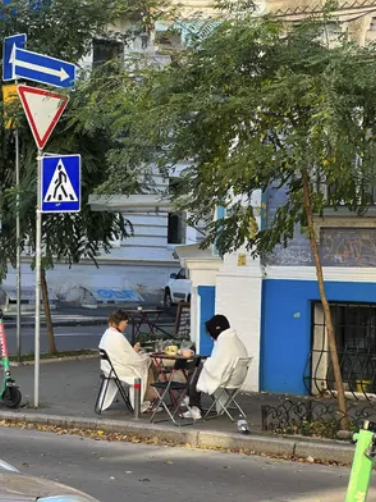
A photo that Liubov Tsybulska said she took of people in a Kyiv on cafe just minutes after air raid sirens stopped on Monday. Liubov Tsybulska
She said people in Kyiv had become "much more resilient" than when the war started, and life had changed.
"Everybody is reading what to do in case of nuclear attack ... people are much more resilient, we know that there is no way back. We cannot lose this war."
READ MORE
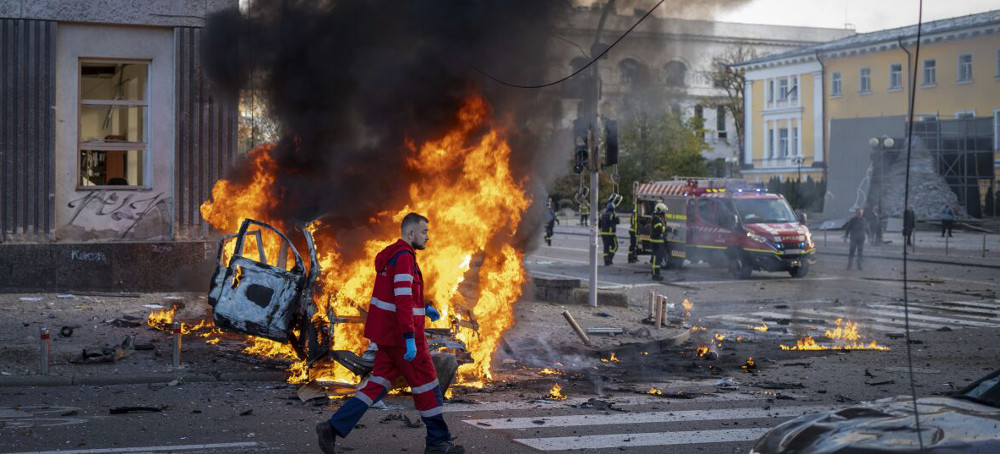 A medical worker runs past a burning car after a Russian attack in Kyiv, Ukraine, Monday, Oct. 10, 2022. Russia unleashed a lethal barrage of strikes against multiple Ukrainian cities Monday, smashing civilian targets including downtown Kyiv where at least six people were killed amid burnt-out cars and shattered buildings. (photo: Roman Hrytsyna/AP)
A medical worker runs past a burning car after a Russian attack in Kyiv, Ukraine, Monday, Oct. 10, 2022. Russia unleashed a lethal barrage of strikes against multiple Ukrainian cities Monday, smashing civilian targets including downtown Kyiv where at least six people were killed amid burnt-out cars and shattered buildings. (photo: Roman Hrytsyna/AP)
Putin's Rage Against Civilians May Herald a Brutal New Phase in the War
Stephen Collinson, CNN
Collinson writes: "Vladimir Putin's latest display of brutality and vengeance might be a fit of fury over his signature Crimean bridge being blown up. But his indiscriminate targeting of Ukrainian civilians also raises the prospect of a horrific new turn in a vicious war."
Vladimir Putin’s latest display of brutality and vengeance might be a fit of fury over his signature Crimean bridge being blown up. But his indiscriminate targeting of Ukrainian civilians also raises the prospect of a horrific new turn in a vicious war.
Russian missiles damaged a glass-bottomed footbridge in Kyiv that is a popular tourist site, tore into intersections at rush hour and crashed down near a children’s playground on Monday. Power outages rolled across the country, in places cutting off water supplies and transport, in strikes that recalled the terror inflicted on civilians in the invasion’s early days but that had largely ebbed in recent months. Russian forces launched new attacks Tuesday, with rockets hitting two energy facilities in western Ukraine, ahead of Ukrainian President Volodymyr Zelensky’s appearance at an emergency virtual meeting of G7 leaders.
The assaults snatched away the semblance of normality that city dwellers, who spent months earlier in the war in subways turned into air raid shelters, have managed to restore to their lives and raised fears of new strikes.
The message was obvious for the world to see. Putin does not intend to be humiliated. He will not admit defeat. And he is quite prepared to inflict civilian carnage and indiscriminate terror in response to his string of battlefield reversals.
But the targets on Monday also had little military value and, if anything, served to reflect Putin’s need to find new targets because of his inability to inflict defeats on Ukraine on the battlefield.
The bombing of power installations, in particular, Monday appeared to be an unsubtle hint of the misery the Russian President could inflict as winter sets in, even as his forces retreat in the face of Ukrainian troops using western arms.
This possibility that Putin could be heralding a bloody new twist in a war that has gone through multiple strategic phases since the invasion in February was weighing heavy on the minds of political and military leaders in Washington Monday. Their reaction was laced with revulsion that Putin was again unleashing callous warfare against civilians that recalled Europe’s 20th century horrors.
How should the US respond
The attacks on civilians, which killed at least 19 people and injured more than 100 others, also drove new attention to what next steps the US and its allies must take to respond, after already sending billions of dollars of arms and kits to Ukraine in an effective proxy war with Moscow.
President Joe Biden Monday spoke to Zelensky and offered advanced air systems that would help defend against Russian air attacks, but the White House did not specify exactly what might be sent.
John Kirby, the coordinator for strategic communications at the National Security Council, suggested Washington was looking favorably on Ukraine’s requests and was in touch with the government in Kyiv almost every day. “We do the best we can in subsequent packages to meet those needs,” he told CNN’s Kate Bolduan.
Kirby was also unable to say whether Putin was definitively shifting his strategy from a losing battlefield war to a campaign to pummel civilian morale and inflict devastating damage on Ukrainian cities and infrastructure, though he suggested it was a trend developing in recent days and had already been in the works.
“It likely was something that they had been planning for quite some time. Now that’s not to say that the explosion on the Crimea bridge might have accelerated some of their planning,” Kirby said.
An onslaught on civilians would be consistent with the resume of the new Russian general in charge of the war, Sergey Surovikin, who served in Syria and Chechnya. In both places, Russia indiscriminately bombarded civilian areas and razed built-up districts and infrastructure and is accused of committing serious human rights violations.
The rain of fire against Ukrainian civilians on Monday was also chilling, given that it occurred following Putin’s latest nuclear threats and days of debate over whether he might use a tactical nuclear weapon. If he does not, it seems unlikely – given his obliviousness to civilian pain – that any such decision would be motivated by a desire to spare innocents from such a horrific weapon. Still, Kirby said that there was no indication that Russia was activating nuclear arms or that the US needed to change its own nuclear posture.
But French President Emmanuel Macron underscored western concerns that Monday’s rush-hour attacks in Ukraine could be the prelude to another pivot in the conflict.
“It is a profound change of the nature of this war,” he told reporters.
Ex-US official: Putin is telegraphing a grim winter
Retired Lt. Col Alexander Vindman, former director for European Affairs on the National Security Council, said that by attacking targets designed to hurt Ukrainian morale and energy infrastructure, Putin was sending a message about how he will prosecute the war in the coming months.
“He was telegraphing about where he is going to go as we get into the winter. He is going to try to force the Ukrainian population to compromise, to give up territory, by going after this infrastructure,” Vindman said on CNN’s “New Day.”
Bolstering the impression that Ukraine’s power grid was now in the firing line, the Ministry of Defense in Moscow on Tuesday said it launched what it described as a “massive attack” on Ukraine’s “military control and energy system.” Authorities in the western Lviv region reported three explosions at two energy facilities.
Vindman called on the US to provide air defense equipment and weapons that could go after Iranian-made drones used in Monday’s attacks to help protect civilians and power plants.
Igor Zhovkva, Zelensky’s chief diplomatic adviser, told CNN’s Wolf Blitzer on “The Situation Room” that Ukraine had shot down 56 of the 84 missiles and drones that were fired by Russia, in apparent revenge for an explosion on a strategic bridge leading to annexed Crimea that is critical for Moscow’s war effort and is a symbol of Putin’s rule.
“So imagine if we had modern equipment, we probably could raise the number of those drones and missiles downed and not kill innocent civilians or wound and injure Ukrainians,” Zhovkva said.
Any prolonged campaign by Putin against civilians would be aimed at breaking Ukrainian morale and possibly unleashing a new flood of refugees into Western Europe that might open divisions among NATO allies that are supporting Ukraine.
The early signs, however, suggest that Putin has once again misread how the world would respond to his brutality. Macron, for instance, said the attacks would prompt France to increase military assistance to Kyiv. Traumatic footage of Ukrainian civilians live streaming Russian missiles roaring over their heads and explosions may serve to harden the opinion of Western publics facing their own pressure this winter because of Putin’s energy war. And if anything, the turning of fire on civilians hints at Russian – rather than Ukrainian – weakness, since it suggests Putin is unable to respond in the field to humiliating defeats for his forces.
The lesson of this horrible war is that everything Putin has done to fracture a nation he doesn’t believe has the right to exist has only strengthened and unified it.
Olena Gnes, a mother of three who is documenting the war on YouTube, told CNN’s Anderson Cooper live from her basement in Ukraine on Monday that she was angry at the return of fear and violence to the lives of Ukrainians from a new round of Russian “terror.”
But she vowed while cradling her infant that Putin’s tactics wouldn’t work.
“This is just another terror to provoke maybe panic, to scare you guys in other countries or to show to his own people that he is still a bloody tyrant, he is still powerful and look what fireworks we can arrange,” she said.
“We do not feel desperate … we are more sure even than before that Ukraine will win and we need it as fast as possible because … only after we win in this war and only after Russia is defeated, we will have our peace back here.”
READ MORE
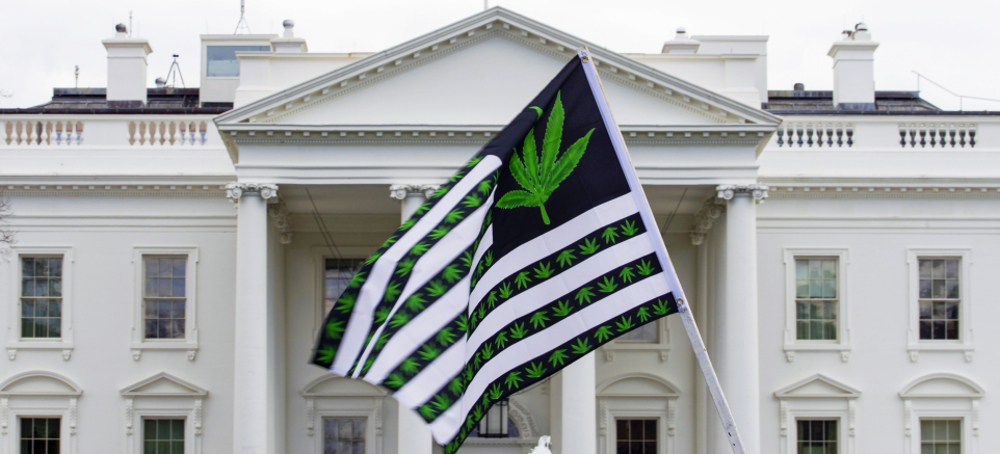 A demonstrator waves a marijuana-themed flag in front on the White House. President Biden is pardoning thousands of Americans convicted of 'simple possession' of marijuana under federal law. (photo: Jose Luis Magana/AP)
A demonstrator waves a marijuana-themed flag in front on the White House. President Biden is pardoning thousands of Americans convicted of 'simple possession' of marijuana under federal law. (photo: Jose Luis Magana/AP)
David Sirota | GOP Govs Reject Cannabis Pardons After Getting Private Prison Cash
David Sirota, The Lever
Sirota writes: "Republicans brush off Biden's request for leniency as private prison donors dump big money into GOP coffers."
Republicans brush off Biden’s request for leniency as private prison donors dump big money into GOP coffers.
Republican governors rejecting a new White House call to pardon low-level marijuana offenders have raked in big campaign donations from the private prison industry that has a financial interest in continuing the drug war.
Last Thursday, Biden said he is “calling on governors to pardon simple state marijuana possession offenses.” In response, Republican Govs. Greg Abbott (Texas), Bill Lee (Tenn.) and Asa Hutchinson (Ark.) issued statements brushing off the request.
Those three governors have raked in more than $263,000 from donors linked to the private prison industry, which profits off tough-on-crime policies and incarceration. In all, the private prison industry has funneled more than $1 million into state elections in the last 4 years, mostly to Republicans.
Additionally, since 2020, two private prison giants alone — CoreCivic and the GEO Group — have dumped more than $1.7 million into the Republican Governors Association which bankrolls GOP gubernatorial campaigns across the country. Meanwhile, the industry has spent more than $8.5 million on state lobbying in the last three years.
The dynamic hints at the next obstacle in efforts to reform the nation’s drug laws. As more state lawmakers face pressure to decriminalize or legalize marijuana, the prison industry, backed by campaign donations, could intensify its efforts to preserve drug-war policies that maintain current incarceration rates — and its profits.
The industry openly admits the connection between such policies and its revenues. For instance: CoreCivic’s most recent annual report notes that the company’s profits rely on harsh drug laws.
“The demand for our facilities and services could be adversely affected by the relaxation of enforcement efforts, the expansion of alternatives to incarceration and detention, leniency in conviction or parole standards and sentencing practices through the decriminalization of certain activities that are currently proscribed by criminal laws,” says the report. “Any changes with respect to drugs and controlled substances or illegal immigration could affect the number of persons arrested, convicted, and sentenced, thereby potentially reducing demand for correctional or detention facilities to house them.”
A large share of private prison industry donations have flowed to Republicans in Florida, where the GEO Group is based and where it has been awarded state contracts.
The industry has donated more than $1 million to Florida Republican Party committees, and another $269,000 to Florida Gov. Ron DeSantis (R), who has not commented on Biden’s pardon request.
Not all Republicans are opposing Biden’s reforms. Reps. Dave Joyce (R-OH) and Nancy Mace (R-SC) both praised the move, with the latter telling Fox Business: “I don’t always agree with the Biden administration, I’ve been very vocal about that, but this is a step in the right direction.”
READ MORE
Trump Lawyer Told to Certify Mar-a-Lago Document Search She Did Not Conduct
Hugo Lowell, Guardian UK
Lowell writes: "Christina Bobb told justice department on Friday that she signed supposedly complete list of documents at direction of another lawyer, Evan Corcoran."
READ MORE
Mexico Files New Lawsuit Against US Gun Dealers
Al Jazeera
Excerpt: "Mexico has filed another lawsuit in the United States against US companies it says are fuelling a surge in homicides and the flow of illegal weapons into the country, the Mexican foreign minister announced."
READ MORE
Climate Reparations Are on the Agenda at COP27 - Whether Wealthy Nations Like It or Not
Naveena Sadasivam, Grist
Sadasivam writes: "As the years passed, Nasirpur residents also began contending with declining snowmelt from the Himalayas and rising sea levels. These climate change-fueled phenomena made the area's river system saltier - a disaster for the farmers who depended on reliable freshwater flows."
READ MORE
Contribute to RSN
Follow us on facebook and twitter!
Update My Monthly Donation
PO Box 2043 / Citrus Heights, CA 95611







